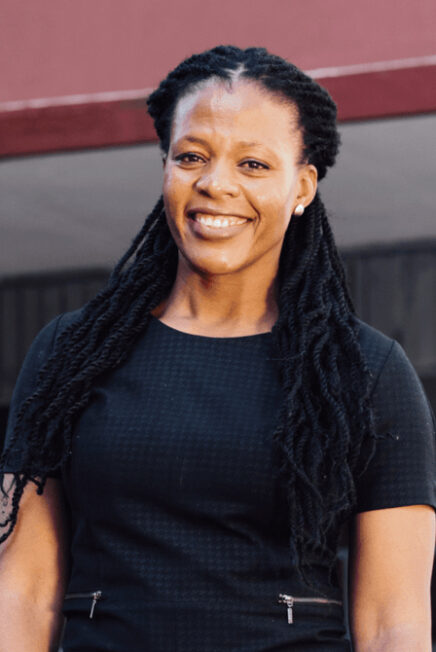
Improved access includes the usability and quality of these services, with most fintech solutions targeting the underserved population, including the youth, women, low-income earners, rural communities, and SMMEs. These groups have faced many barriers to accessing banking, credit, savings and investment solutions from large banks and other financial institutions.
By solving some of Africa’s biggest challenges, we are creating impact and new business models, markets and sectors that will deliver positive commercial outcomes.
According to the IFC, in 2011, only 23% of Africans had access to a formal bank account. That number has grown to 43% in the decade since, much of which can be attributed to the fintech and mobile money solutions developed since 2011.
By bringing more people and businesses into the financial system, we are improving household incomes and well-being and creating a new group of consumers and producers that will contribute to GDP growth. For example, in 2021, Kenya is reported to have an 83.7% financial inclusion in services and products, a jump from 26.7% in 2006, largely driven by new financial technology and innovations, particularly in mobile money and mobile banking.
Founders Factory Africa, to date, has supported 57 startups since its inception in 2018. Of these, 27 are fintech, including OkHi, a smart-addressing and verification platform that identifies customers based on their mobile number and GPS.
Zazuu is building an end-to-end money transfer marketplace that lowers the cost of remittance payments into Sub-Saharan Africa.
EasyEquities is a fitting example of an investment platform that has democratised retail investments by lowering barriers for first-time investors. By fractionalising shares, they made them more affordable, removed minimum thresholds for the initial investment amount, simplified the language of investments, and made the platform super easy for first-time investors.
Six years after its creation, EasyEquities now boasts more than 1.6 million users with platform assets of R37 billion, reported revenues of R214m (up 24% from 2021) and profit before tax of R80m.
Purple Group, the parent company, reported a 92% increase in headline earnings per share in a down market, and a significant portion of this attributable to easy equities.
Financial inclusion is not just an “impact” story. It benefits everyone.
EasyEquities is making great strides in enabling more South Africans to start building wealth through investments and ultimately narrowing the wealth gap in South Africa.
The success of these fintech startups has been driven by their ability to meet an underserved need in the market. They are not only solving financial inclusion for individuals but also for companies as well.
Large banking institutions have, to date, partnered with or acquired fintech to improve the distribution of their financial products to markets they have yet to be able to reach previously while increasing their share of the revenue.
Large commercial banks are competitively trying to retain market share, with fintech companies challenging their previously moated positions. In response to these fintech pressures, large corporates engage in M&A activity for various reasons, including access to disruptive intellectual property and tech products, scarce tech talent, and gaining speed to market.
In South Africa, Capitec, South Africa’s third-largest bank by market cap and among the 20 largest banks in Africa and the Middle East as of December 2022, added EasyEquities to its banking app in 2020.
For SMMEs and startups, which are traditionally considered risky and are either excluded from traditional financial institutions or allowed access to these services at exorbitant costs, fintech has been at the forefront of developing innovative solutions to increase access, quality, and usage of financial services.
In 2020, Founders Factory Africa invested in Asaak, a Ugandan fintech startup that partners with mobility and e-commerce platforms to make motorcycle ownership easier for riders who earn a living by operating boda bodas (motorcycle taxis).
That same year, Asaak granted loans up to $419k; in 2021, this grew to $2.1m, and in 2022, they reported loan disbursements of $6.9 million.
In the last 3 years, Asaak has disbursed more than 11,000 loans to micro-enterprises that traditional credit checks would have otherwise screened out.
By leveraging technology and applying responsible and innovative tools for assessing creditworthiness, they have achieved this success while maintaining a 95% collection rate, better than industry standards.
While we have seen strides in innovation and financial inclusion since 2010, there is more work to do.
According to the Global Findex Database, the gender gap in mobile money account ownership is slowly closing globally, but other markets are lagging, especially in the Middle East and North Africa (MENA).
Sub-Saharan Africa reported a 12% gender gap in account ownership in 2021, while North Africa and the Middle East reported a 13% gap, twice as large as the developing economy average and three times higher than the global average.
Meanwhile, in East Asia and the Pacific, the gap is 3% and 7% in Latin America and the Caribbean. Around 75% of African tech startups shut down before they raise a Series A round due to lack of funding, and we still have a $330 billion funding gap in MSMEs in Africa.
To address the above gaps, a systems-thinking approach is required to challenge the status quo, shift mindsets, and explore transformative interventions across stakeholders, which improve economic participation by all members of society.
By Thabiso Foto, Chief Financial Officer, Founders Factory Africa. Thabiso is an experienced executive who desires to leverage finance as a catalyst for inclusive economic growth and development in Africa.




